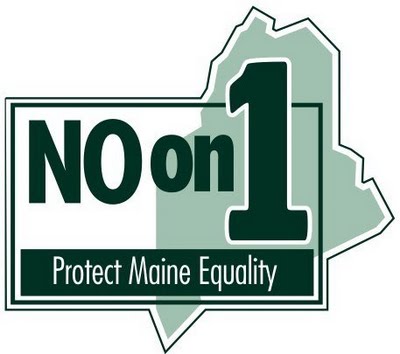Yes Campaign Ad Promoting Domestic Partnerships a ShamBiggest Funders, Managers Opposed DP
Portland, Maine (October 30, 2009)---
The NO on 1 campaign charged that the biggest backers and manager of the Yes campaign have opposed domestic partnerships for same-sex couples for years, even though their latest political ad promotes Maine's domestic partner registry.
After weeks of a paid advertising campaign that attacked Maine schools --attacks that were rejected by Maine newspapers, the Commissioner of Education, the Attorney General and others -- the Yes campaign released a new ad this week applauding the state's DP registry as sufficient to protect same-sex couples and their families.

But in fact, campaign manager Mark Mutty, as director of public affairs for the Roman Catholic Diocese of Portland, opposed the DP registry bill both in 2003 and again in 2004 when it passed in the Maine Legislature.In addition, Mutty and others associated with the Yes campaign were silent on the alternative bill to the marriage equality legislation this spring which would have expanded the DP registry.
"This is the height of hypocrisy and double-talk," said Jesse Connolly, NO on 1 campaign manager."Their new ad actually invokes domestic partnership as a solution, yet they' re on record either directly or by their silence as opposing even this measure of protection."
In testimony submitted for the 2003 DP bill entitled "An Act to Promote the Financial Security of Maine's Families and Children," Mutty wrote and signed on behalf of the Roman Catholic Diocese of Portland:
"Our opposition to LD 1579 is foremost rooted in moral and ethical principles that are not only applicable to Catholics, but serve society well as a whole. However there are more practical considerations...Several attorneys who have reviewed this bill have indicated their strong conviction that such a drastic change in the code would lead to mass confusion in the courts and tie up probate claims for months without clear resolution. These are but a few of the perhaps unintended consequences that such a measure would bring to Maine."
"When I wrote Maine's domestic partner registry law, no group fought against it harder than the Roman Catholic Diocese," said former State Representative Benjamin Dudley, sponsor of the bill creating Maine's domestic partner registry."Now the Diocese, through its campaign against marriage equality, says they 'want to be tolerant of gays' and stands behind the registry law they fought so hard to defeat. I'd call that the height of irony."

In addition, Maggie Gallagher, the president of the National Organization for Marriage, which has contributed at least $1.6 million to the Yes campaign, has long opposed both domestic partnerships and civil unions. In fact, Gallagher, in 2002 argued against DP benefits because they "erode the status" of marriage.Finally, the principals of the Yes campaign were notably silent on a 2009 bill entitled, "An Act to Expand Rights for Maine Families," which would have expanded Maine's DP registry, and was proposed as an alternative to the marriage equality law.
"The Yes campaign in the final hours of this election can't simply reinvent itself and try to claim some sort of new platform," added Connelly."The record shows that time and time again, they either opposed domestic partnerships or were silent on them, even when they were offered as an alternative to full marriage equality. This is nothing more than a Trojan horse and voters should not be fooled."

"The DP registry, in fact, has a few but not the hundreds of protections spouses receive under marriage," added Mary Bonauto, the civil rights director at GLAD and a member of NO on 1's executive committee."Separate systems are not equal and never have been. Domestic partner laws simply don't apply to the things that allow you to take care of your partner or your children, and it is still impossible for many people to get a family policy of health insurance without getting married.
"Marriage offers protection in times of greatest need and crisis," added Bonauto. "Equality, family, protection and respect only come in one package, and that's marriage."
MPBN is already picking up on this story and more Maine media will soon be doing the same.
 And I have gotta ask ta ask something that's been really puzzling me this week:
And I have gotta ask ta ask something that's been really puzzling me this week:
WHERE IN THE WORLD IS 'SFMM/YES ON 1' LEADER MARC MUTTY?

For that matter, where is Bishop Richard Malone??
Something is really odd here- "sick" does not cover it. This is just bizarre...
Tonight, before volunteers started phone banking, several Mainers, Ann DiMella, Sue Comyns, Wallace Pinfold and Dick Moll, told them why this matters so much.
This is a guest post by Allyson Robinson. She is the sometime writer of the blog Crossing The T, and the Associate Director of Diversity at the Human Rights Campaign (HRC).
Allyson is another trans community voice who I asked to share their thoughts on federal hate crime legislation -- the hate crime legislation that was signed by President Obama on October 28, 2009.
~~Autumn~~
By Allyson Robinson
In remarks delivered at the White House reception marking his signature of the Matthew Shepard and James Byrd Jr. Hate Crimes Prevention Act, President Obama said, "No one in America should ever be afraid to walk down the street holding the hand of the person they love. No one in America should be forced to look over their shoulder because of who they fefare." As corny as it sounds, it felt a little like the President was holding my hand or watching my back when he said those words.
 My wife Danyelle and I have been married for 15 years and for most of that time, we were that stereotypically sappy couple everyone hates. If we were in arm's reach of each other, we were holding hands. If more than 15 minutes had passed since we'd kissed last, we kissed, and we didn't care who was watching. We were a romantic comedy's worth of winks, loving looks, and giggles. But all that was before I began my gender transition and started being perceived by the public as a woman.
My wife Danyelle and I have been married for 15 years and for most of that time, we were that stereotypically sappy couple everyone hates. If we were in arm's reach of each other, we were holding hands. If more than 15 minutes had passed since we'd kissed last, we kissed, and we didn't care who was watching. We were a romantic comedy's worth of winks, loving looks, and giggles. But all that was before I began my gender transition and started being perceived by the public as a woman.
Just a couple of months ago, we were enjoying some time together without our four children - an occurrence that is all too rare for us these days - having dinner and seeing a movie a the local cineplex. As we walked through the mall to the theater, our steps drifted closer to each other, and our hands touched. Instinctively, Danyelle reached out to take my hand in hers. Just as instinctively, I pulled my hand away, lest anyone around us see. She was hurt, and so was I, but talking about it later we both agreed that the risk of harassment or violence was just too great. There will be no more public hand-holding for us. Our fear for our safety has pushed our perfectly legal, perfectly reasonable, perfectly laudable affection for one another into the closet.
Back when I was publicly perceived as a man, I never looked over my shoulder - never. I played high school football, attended Army paratrooper school, led infantry soldiers on patrol through the Korean DMZ and air defense soldiers in convoy through city streets where we knew we were being targeted for terror attacks. I am trained in self-defense and was even a pretty good boxer at West Point. But I've realized that none of these things are what allowed me to walk alone through a dark parking lot or down an alley without fear. What kept me from feeling afraid back then was the simple fact that, as a white male, I was just not a target. It wasn't long after I began my transition that I came to understand just how much things had changed for me. Today I diligently avoid places I never hesitated to enter before because I am a target. With little more than a change of wardrobe, I transited from one of the least vulnerable classes of people in our society to one of the most. Looking over my shoulder has become second nature.
President Obama's words - "No one should be afraid to hold a loved one's hand or be forced to look over their shoulder" - speak to the lofty ideal behind the Matthew Shepard and James Byrd Jr. Hate Crimes Prevention Act. They remind us of our Constitution's commitment to life as the first "inalienable right." They acknowledge painful the truth Americans are often either too ashamed or too arrogant to admit: that some of us have less value in the public mind than others, and crimes committed against us weigh less heavily on the public conscience than crimes committed against others. And they commit the strength of the President, the power of Congress, and the authority of the federal government to the protection of those who are made vulnerable by such prejudice and ignorance. That's what the Shepard-Byrd Act means to me.
Let's be realistic: this law will not prevent the next anti-trans or anti-gay hate crime from happening, nor the one after that. Hate will hurt and kill again, and again. Danyelle and I don't feel any safer holding hands in public today than we did yesterday, and I'll still look over my shoulder when I walk to my car tonight. But something has changed. Yesterday, my own federal government had not yet embraced its responsibility to guarantee my right to life by protecting me, and those like me, from acts of senseless violence. Today, my human value, as a tras a transgender person and a lesbian, is explicitly acknowledged, for the first time in history, in the law of the land.
One of the elder statesmen of the LGBT civil rights movement once told me that, as hard as passing good laws is, it's really one of the easiest parts of our work. "The hard part," he said, "is changing the culture in ways that undergird those good laws - so that our children's generation will find it hard to believe we needed laws like this in the first place." I think, though, that good laws - when they're properly understood and adequately enforced - can contribute to cultural change. Because of the Shepard-Byrd Act, maybe one day my children will really be able to hold the hand of a loved one without being afraid of how people will react or walk down the street without looking over their shoulder. Then, and only then, will our work be done.
~~~~~
Related:
* Pam's House Blend tag: Transgender Hate Crimes Essay Project




 Subscribe to daily Email
Subscribe to daily Email


No comments:
Post a Comment